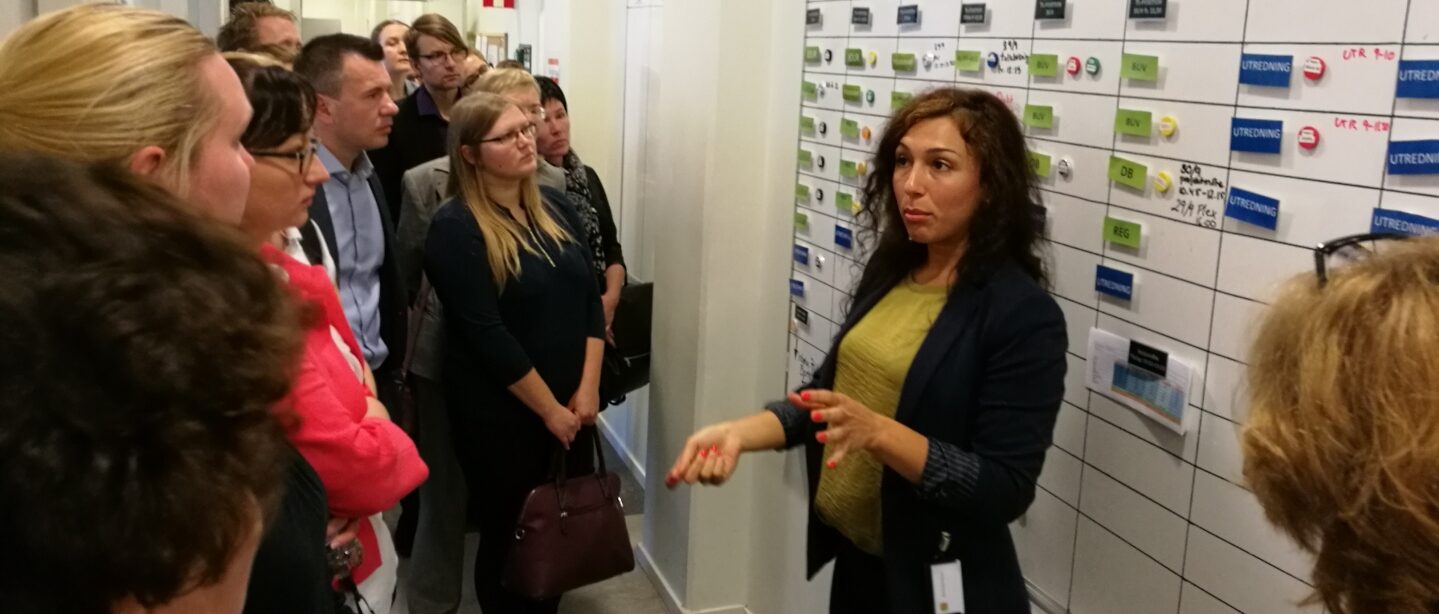A visit for better quality
What is the best way to prepare before conducting an interview with an asylum-seeker? This was just one of several questions that were raised when representatives working with the asylum process in Estonia, Latvia and Lithuania visisted the Swedish Migration Agency. Their aim is to improve the quality of the whole process.
During the visit, the representatives from Estonia, Latvia and Lithuania got an introduction to how the Swedish Migration Agency organises its work © UNHCR / Anders Aalbu

During the visit, the representatives from Estonia, Latvia and Lithuania got an introduction to how the Swedish Migration Agency organises its work © UNHCR / Anders Aalbu
by Anders Aalbu, UNHCR Stockholm.
Latvia is now on its way with a UNHCR quality initiative project. The project aims at ensuring that the whole of the asylum process – from when an asylum-seeker submits an application to when a decision is made – is fair, effective and quality-based in all of its aspects. As part of the initiative, representatives from Latvia, Estonia and Lithuania visited the Swedish Migration Agency’s headquarters in Stockholm. The Head of the Asylum Affairs Division of the Office of Citizenship and Migration Affairs in Latvia, Līga Vijupe, found it very interesting to listen to the experiences of the Swedish Migration Agency.
“They have many years of experience that we can learn from. And they are interested in listening to how we work as well. This meeting is also useful because we get to meet our colleagues from Estonia and Lithuania. When it is only a few countries coming together, we get time to talk,” Vijupe says, adding that it is difficult to find time for these kind of discussions during regular workdays.
“Despite the very different numbers of asylum-seekers arriving in Sweden and the three Baltic countries, we also face some similar challenges.”
The quality initiative project also provides specific training to case-workers who are responsible for different parts of the asylum process, such as reception, interviews and decisions-writing. A wide range of features ensures quality in the process.
Seemingly obvious, yet also complicated, is the practice of ensuring that the asylum-seeker and the interpreter understand each other. There is a broad range of languages and dialects in some of the regions that our asylum seekers come from – quality controls to ensure that the interpreter can translate correctly what the asylum seeker is saying is a prerequisite for a fair interview and a fair asylum process. It is also important to conduct the interview under circumstances that don’t make the asylum-seeker nervous. With these aspects addressed, it is more likely that the asylum-seeker will be able to provide evidence to strengthen his or her application for asylum.
Lithuania, like several European countries, has already gone through the quality initiative process. Now the Lithuanian authorities have the opportunity to enrich the procedures used in Estonia and Latvia, see what tools they have used and compare them the tools used by the Swedish Migration Agency, and consider if the tools should be adapted.
Viktor Ostrovnoj, Head of the Asylum Unit of the Migration Department under the Ministry of the Interior in Lithuania, was fascinated by how the Swedish Migration Agency is divided into many units. As a Head of Department in Lithuania, he has to manage and organise a broad set of tasks that in Sweden are divided to many different units.
“I found it interesting to learn more about how the case-workers at the Swedish Migration Agency make preparations before the interviews with the asylum-seekers, in order to conduct them in the best possible way. I will try to adopt some of this in Lithuania too,” Ostrovnoj said.
The head of the International Strategies Unit at the Swedish Migration Agency, Elin Svensson, presented the Swedish Migration Agency’s work, and also wanted to hear from the representatives from the Baltic countries. “This is a great arena for exchanging experiences. It is important to learn from each other,” she said.
Svensson gave a broad introduction and emphasized the holistic approach the Swedish Migration Agency uses in its organisation. Over 160,000 people applied for asylum in Sweden in 2015. Even though none of the Baltic States are close to this number, they have also seen an increase. And when they are taking part in both relocation and resettlement of refugees, quality in the asylum process is even more important.
UNHCR’s Regional Liaison Officer for Estonia, Latvia and Lithuania, Marcel Colun, hopes Estonia will be the next country to start the quality initiative process.
“We hope that the Estonian authorities see the value of doing a similar project in their country. They are also taking part in the relocation of refugees and will benefit from having the best possible quality in the asylum process.”
Colun adds that UNHCR also wants to listen to how the UN Refugee Agency can address possible challenges the authorities in the Baltic countries face.
“This can be through contributions which strengthen the asylum systems in the countries, either as interventions directly or through projects, capacity building and other measures.”
Share on Facebook Share on Twitter
